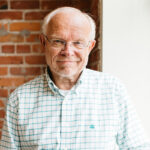When Jesus Chose Not to Explain
Mentoring like Jesus reminds us that he not only preached, taught, and explained—he sometimes resisted the instinct to explain. I know the feeling too well.
My urge is to speak, to fill the silence, to provide my answer to their “problem,” to tell them how it worked for me. As a rabbi, Jesus’ goal was seldom informational. More often, it was formative and especially transformational.
- Sometimes he used short “sermons” like his favorite: “Repent and follow me.” (Mark 1:15-17)
- Often, he used single provocative sentences to assess readiness: “Come and see.” (John 1:19)
- Indirection was a favorite: “Teacher, I will follow you wherever you go.” What did Jesus reply? “Foxes have holes, birds have nests, but the son of man has nowhere to lay his head.” (Matthew 8:20)
- My response: an honest, “Huh?” I need time to ponder.
- Evocative questions were a signature practice of his work: “Do you want to be healed?” Who asks that of a man paralyzed for 38 years? (John 5:6)
- Probing questions. “Who do you say that I am?” (Matthew 16:15-16)
- Parabolic and thoughtful images: “See, I am sending you out like sheep into the midst of wolves.” (Matthew 10:16)
- In particular moments, he used a personal, intuitive, probing question to evoke personal reflection: “Are you a teacher of Israel and yet you do not understand these things?” (John 3:10)
- He freely spoke truth when he saw it: “…You have five husbands and the one you have now is not your husband.” (John 4:17-18)
- To all, he invited their response, or did he incite it? “Let anyone who has ears to hear listen!” (Luke 8:5)
How Jesus Listened Deeply
Jesus, I believe, was fully alive and fully alert to listen to three “texts”:
- His Abba, who sent him:
“The Son can do nothing of his own accord, but only what he sees the Father doing.” (John 5:19)
- Those he came to love and serve:
“When he saw the crowds, he had compassion for them.” (Matthew 9:36)
- The Torah, our scripture:
“Blessed are those who hear the word of God and obey it.” (Luke 11:28)
Questions for Today’s Mentors
When your instinct is to explain, pause. Ask yourself:
- What question might I ask instead? Right answers may not awaken the soul.
- How might I help them see it for themselves? Adults learn best when they wrestle with their own questions.
- What might be hidden in their question? Do they need my little sermonette—or a pathway to their own thinking, encouragement, and inspiration? Of course, there are times we tell our own story but judiciously.
- How might I create space for personal reflection—theirs, not mine?
- Can I remember that my hope is to awaken the heart as a catalyst for change, not just fill the mind?
A Mentee’s Perspective: Growing Beyond Easy Answers
Imagine how a mentee might approach a mentoring session with Jesus:
I used to think that learning meant getting answers.
I’d come with my questions about faith, pain, calling, or people. I’d hope someone would explain it clearly. Tie it up. Show me how it works. I wasn’t asking for it to be easy, just understandable. I wanted a mentor who could break it down, offer a clean truth, something I could carry with confidence into the mess of life.
And then came Jesus.
He didn’t explain things the way I expected. He didn’t start with the answers. Sometimes it seemed he barely answered at all.
I’d listen to him speak and feel both comforted and confused. One moment, he’d say something so clear. Like, “Follow me.” The next moment, he’d spin a parable about seeds and soil, a banquet or a vineyard—and then just stop. “Anyone with ears to hear. Listen.”
I had ears. I was listening, but I wasn’t sure I was hearing. I kept waiting for the part where he explained it all, line by line, but he seemed more interested in asking questions than always giving answers.
“Who do you say that I am?” “Why are you afraid?”
I wanted instruction. He gave me space.
Choosing Reflection Over Instruction
I came looking for clarity, but what I received was reflection. Not silence, exactly, but a kind of holy restraint. A knowing that what I needed wasn’t always a solution—it was a shift. A turning of the heart, not just the mind.
Sometimes he saw right through me to the real question beneath the one I asked. And instead of fixing it, he waited, or he told a story, or he just looked at me, as if to say:
“You already know more than you think. Trust what is stirring within.”
It was unsettling. It was kind. And it taught me something I didn’t expect: I learn best not when someone explains everything to me, but when someone trusts me to grow into it.
Jesus teaches that way still.
Not always with answers, but with presence. Not always with explanations, but with an invitation.
As a mentor and mentee, I’m learning to stop reaching for the quick clarity and instead sit with the questions. To hold the tension. To notice what God is revealing—in me, in the person across from me, and in the voice of the Spirit. Listening not just for “truth,” but to how I am being drawn toward it in the story seated before me.
I’m not where I thought I’d be either as mentor or mentee, but I’m beginning to see maybe that’s the point. This imagined soliloquy from a mentee strikes home for me as a mentor—I want to ask: Do I have ears to hear?
Practice:
- What did you hear yourself saying as you read today’s blog?
- How might you create more space for reflection—in your own heart and in those you mentor?
_______________________________

Keith Anderson, D.Min., is a Faculty Associate for Spirituality and Vocation at VantagePoint3 and President Emeritus of Seattle School of Theology and Psychology. He is the author of several books, including his most recent: On Holy Ground: Your Story of Identity, Belonging and Sacred Purpose (Wipf & Stock, 2024). His other works include Reading Your Life’s Story (IVP, 2016), A Spirituality of Listening (IVP, 2016), and Spiritual Mentoring (IVP, 1999). In his writing, teaching, and mentoring, Keith seeks to set a table for people looking to enter the “amazing inner sanctuary of the soul” in the most ordinary and extraordinary moments of life.

